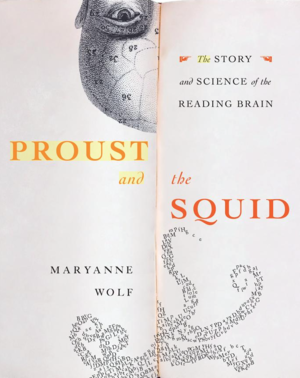Proust and the Squid
The Story and Science of the Reading Brain
Human beings were never born to read. Reading is a human invention that reflects how the brain rearranges itself to learn something new. Proust and the Squid chronicles the remarkable journey of the reading brain not only over the past five thousand years, since writing began, but also over the course of a single child's life, showing in the process why children with dyslexia have reading difficulties and singular gifts.
Lively, erudite, and rich with examples, Proust and the Squid asserts that the brain that examined the tiny clay tablets of the Sumerians was a very different brain from the one that is immersed in today's technology-driven literacy. The potential transformations in this changed reading brain, have profound implications for every child and for the intellectual development of our species.
Critical Acclaim
“[Maryanne Wolf] displays extraordinary passion and perceptiveness concerning the reading brain, its miraculous achievements and tragic dysfunctions.” —BookForum
“Everything Wolf says makes sense....She clearly knows her stuff.” —Washington Post Book World
“Brilliant and eye-opening.” —Albany Times Union
“...intriguing...” —New Scientist
“Fascinating....Wolf restores our awe of the human brain.” —Associated Press
“[Wolf’s] conversational style, reflective comments and insights from work with children...create a narrative flow and bright tone.” —Minneapolis Star Tribune
“The squid of Wolf’s title represents the neurobiological approach to the study of reading....Given the panic that takes hold of humanists when the decline of reading is discussed, her cold-blooded perspective is opportune.” —The New Yorker
“A book worth talking about.” —U.S. News & World Report
“Enjoyable....Wolf, with remarkable agility in a relatively compact book (intended for both aficionados and the uninitiated), transitions seamlessly between disciplines as diverse as linguistics, neuroscience, cognitive psychology, and archeology, among others. Her voice comes through clearly; she is fascinated by reading and shares that energy.” —New England Journal of Medicine
“Wolf’s alarm about the spread of semi- literacy among the young is obviously justified, and her book provokes thought about it as only reading can.” —Sunday Times (London)
“This humane and fascinating book...is a paean to what Proust, über-reader, called ‘that fruitful miracle of a communication in the midst of solitude,’ to all that has been and can be achieved for individuals and for mankind through literacy.” —The Evening Standard (London)
“Blindingly fascinating...detailed and scholarly....There’s a lot of difficult material in here. But it’s worth the effort....For people interested in language, this is a must. You’ll find yourself focusing on words in new ways. Read it slowly--it will take time to sink in.” —The Sunday Telegraph
“Proust and the Squid is an inspiring celebration of the science of reading....Wolf’s insights are fascinating....Proust and the Squid has much to offer on this important--perhaps the most important--subject” —The Guardian (London)
Reviews of Proust and the Squid also appeared in:
The Sunday Times (London) ~ The Evening Standard (London) ~ Sunday Telegraph (London)
La Repubblica (Italy)
Suddeutsche Zeitung ~ Der Spiegel ~ Frankfurter Allgemeine Zeitung (Germany)
New Yorker ~ New England Journal of Medicine ~ Nature NeuroScience ~ Reading Today ~ Boston Globe
Philadelphia Inquirer ~ Minnesota Star Tribute ~ Washington Post ~ San Francisco Chronicle ~ Oregonian
Orton Gillingham Report ~ Norfolk Portfolio ~ Eldorado Journal/Harrisburg Register ~ Publishers Weekly
US News and World Report ~ Library Journal ~ Book Forum ~ HistoryWire.com ~ New Scientist ~ California Literary Review
Translations
13 Translations and an audio version
High Bridge (Audio Version); Spektrum, Springer Verlag (German); Vita & Pensiero (Italian); Ediciones B (Spanish); Icon Books (United Kingdom); Intershift (Japanese); Czech, Greek, Turkish, Korean, Chinese (2 versions: Traditional Chinese; Simplified Chinese), Swedish, French with Preface by Bernard Stiegler.

